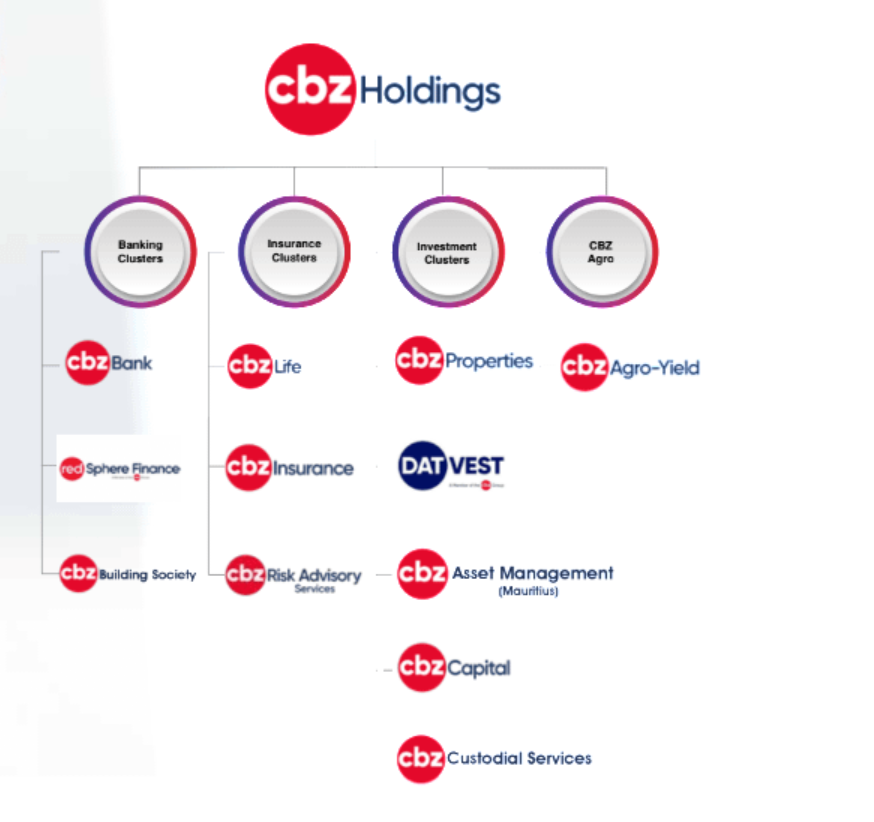Commercial Bank of Zimbabwe (CBZ), the country’s largest and most profitable bank, has finalised a deal to acquire a 31.22% stake in First Mutual Holdings (FMH), one of the country’s largest insurance and property firms, from the National Social Security Authority (NSSA), the state-owned pension fund.

Done deal! CBZ and FMH officials sign for a transfer of 31.22% stake from the later to the former.
The deal, which was approved by CBZ’s shareholders at an extraordinary general meeting on Monday the 4th of September, is valued at US$81 million, consisting of US$21 million in cash and US$60 million in equity. CBZ will pay US$10 million within 10 days of the completion of the deal, and the remaining US$11 million in 18 months. CBZ will also issue 300 million new shares to NSSA at ZWL 2.70 per share, representing a 20% premium over FMH’s market value.
This agreement will increase CBZ’s shareholding in FMH from 3.23% to 34.45%, making it the largest shareholder in the insurance and property group. NSSA will reduce its shareholding in FMH from 66.22% to 35%, but will remain the second-largest shareholder. The deal will also give NSSA a 9.09% stake in CBZ, making it the third-largest shareholder in the bank after the government of Zimbabwe (16.01%) and Kudakwashe Tagwirei (15%).
Needless to say, the transaction is in tandem with CBZ’s ambitious strategy to extend its influence and diversify its income streams in the financial services market, which it already dominates. CBZ is the country’s biggest bank by assets, loans, deposits, and revenues.

Commercial Bank of Zimbabwe Holdings
It is also the country’s biggest agriculture lender, through its arm CBZ Agro Yield, which was established in 2019 as the government sought to replace Command Agriculture with a new bank-led funding model.
Going forward, CBZ now has access to FMH’s insurance business, which includes short-term insurer Nicoz-Diamond and reinsurance arms. FMH’s insurance business made healthy revenues of US$24 million in the half-year to June so far. The deal will also give CBZ access to FMH’s vast property portfolio, which includes office buildings, shopping malls, hotels, and residential properties.
This is a win-win-win situation for CBZ and its shareholders…
According to a valuation and impact assessment report by AMD Capital, a leading financial research firm, the deal will create a financial behemoth, by Zimbabwean standards, with a combined value of about US$2.8 billion, based on the Merger Analysis Report for this transaction.
The report estimates that the value of FMH ranges from US$590 million to US$650 million, based on discounted cash flow (DCF), comparable company analysis (CCA), and precedent transaction analysis (PTA).

First Mutual Holdings Zimbabwe
The likely impact of the deal on each of the three concerned entities’ financial performance, market share, and competitive position, as well as on the shareholders, customers, employees, and regulators, are all dealt with in the same report using various indicators and metrics, such as return on equity (ROE), return on assets (ROA), net interest margin (NIM), cost-to-income ratio (CIR), market concentration ratio (CR), Herfindahl-Hirschman index (HHI), customer satisfaction index (CSI), employee engagement index (EEI), regulatory compliance index (RCI), etc., to measure and compare the impact of the deal.
In a nutshell, The report finds that:
The impact of the deal is positive for CBZ,
as it will improve its financial performance, market share, and competitive position in both the banking and insurance sectors. CBZ’s ROE, ROA, NIM, and CIR are expected to improve in 2023 after the deal, while its CR and HHI are expected to increase in both sectors, indicating a higher market dominance and concentration. CBZ’s CSI and EEI are also expected to improve in 2023 after the deal, as its customers and employees will benefit from the synergies and opportunities from the combined entity.
The impact of the deal is negative or neutral for FMH and NSSA,
as they will lose some of their financial performance, market share, and competitive position in both sectors. FMH’s ROE, ROA, NIM, and CIR are expected to decline in 2023 after the deal, while its CR and HHI are expected to decrease in both sectors, indicating a lower market presence and competition.
FMH’s CSI and EEI are also expected to decline in 2023 after the deal, as its customers and employees may face some challenges and risks from the integration process and the loss of autonomy.
NSSA’s financial performance particularly, its market share, and competitive position are expected to remain stable or slightly improve in 2023 after the deal, however, as it will retain a significant stake in both CBZ and FMH. Be that as it may, it may too face some conflicts of interest and regulatory scrutiny from its dual role as an investor and a regulator.
The impact of the deal is mixed for the financial sector and the stakeholders,
as it will create some benefits and challenges for the stability, efficiency, innovation, and regulation of the sector. The deal will create a more diversified and integrated financial services provider, in the mould of CBZ, that can offer a wider range of products and services to meet the needs of different segments of the population.
This agreement, thus creates a more resilient and robust financial institution that can withstand shocks and crises better than its peers. Showing how much this augers well for this Zimbabwean financial market juggernaut.
Since the equity swap and sales have gone through already, we take it that it passed all “stink tests” from regulators of Mergers and Acquisitions (M&A) in Zimbabwe’s capital markets scene. These include The Securities and Exchange Commission of Zimbabwe (SECZ), The Reserve Bank of Zimbabwe (RBZ), The Zimbabwe Stock Exchange (ZSE), The Competition and Tariff Commission (CTC), Insurance and Pensions Commission (IPC) and The Zimbabwe Revenue Authority (ZIMRA), among others.
One cannot help but notice that this transaction creates a very dominant and concentrated financial player, in the form of CBZ, that can pose systemic risks and distort market competition. It will also create a more complex and dynamic financial environment that can pose regulatory challenges and require more coordination and cooperation among different regulators, than if they try to police CBZ as individual officials henceforth.
The report is available for free to AMD Capital Newsletter subscribers.
Quite notable here is the deal's paradoxical nature, as it involves three entities that are all partly or wholly owned by the government of Zimbabwe, which makes it both a player and an umpire.
CBZ is 16% owned by the government through Zimre Holdings Limited (ZHL), which is 100% owned by the government through Industrial Development Corporation (IDC). FMH is 66% owned by NSSA, which is 100% owned by the government through the Ministry of Public Service, Labour and Social Welfare. NSSA is also regulated by IPEC, which is a statutory body under the same ministry which owns NSSA.
Was the government objective enough here, and in other instances, to transact fairly and then judiciously audit itself against laid regulations non prejudicial to any stakeholders?
This instantly raises questions about the rationale, and indeed motives, behind such a transaction among state-owned entities with common and interconnected shareholders. But as stated earlier, if it has been OK’ed by all the regulators, then we must trust they found nothing concerning enough to stop the transaction.
Or did they? Regardless, the deal is expected to close by the end of September 2023.
Commentators from various stakeholders in the financial sector and the public have so far given mixed reactions. Some have welcomed the deal as a positive development that will create value and benefits for the entities involved and the sector as a whole.
Others have criticised the deal as a negative development that will create risks and challenges for the entities involved and the sector as a whole. Some have also questioned the rationale and motives behind the deal and its implications for the governance, transparency, and accountability of the state-owned entities.
This does not take away from the agreement that it is one of the largest and most significant M&A transactions in Zimbabwe’s financial sector in recent years. It reflects CBZ’s ambition and confidence to dominate the financial sector by buying out its rivals.
FMH, on its part, is selling its shares to CBZ because it needs to raise capital and reduce its debt. According to a news article, FMH has been struggling with liquidity challenges and high interest costs, which have affected its profitability and solvency. By selling part of its stake to CBZ, FMH can improve its cash flow and balance sheet, as well as benefit from CBZ’s expertise and network in the financial sector.
NSSA, on the other hand, is swapping its shares in FMH for CBZ’s shares because it wants to diversify its portfolio and increase its returns. According to a report by the outgoing Auditor General, Ms Mildred Chiri, NSSA has been facing governance and investment issues, which have resulted in poor performance and losses.
By swapping part of its stake in FMH for CBZ’s shares, NSSA can reduce its exposure to the insurance and property sector, which has been affected by the economic crisis and hyperinflation in Zimbabwe, and gain access to the banking sector, which has been more resilient and profitable.

National Social Security Authority of Zimbabwe
So perhaps this is a tripartite win for all involved after all.
All in all, the deal is a milestone and a turning point for Zimbabwe’s financial sector. It is a sign of CBZ’s big bet on the future of the sector. It is also a sign of FMH’s and NSSA’s gambit on the current and future strength of CBZ. The deal will shape and define the future of Zimbabwe’s financial sector as well as test and challenge the future of the country’s financial sector.
While CBZ manoeuvred around fouling any regulatory infractions with this deal that makes it a more dominant and diversified financial services provider, it may be a lose-lose for FMH and NSSA, as they will become more dependent and vulnerable to CBZ in the long term although short term they get to cover immediate concerns like debt and diversity, respectively.
The deal is done, but the story is not over. What will be the consequences and repercussions for CBZ, FMH, NSSA, and certainly the financial sector? CBZ is betting big on Zimbabwe’s financial sector. Will it pay off or backfire?
Only time will tell.



